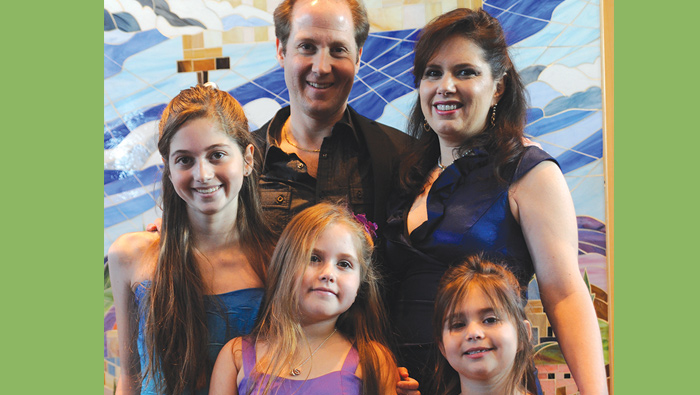Some people might think winning the lottery would make all their dreams come true. In the case of Jacqui Breger, her family winning the “lottery” was not only good for her, but her good fortune has grown to benefit countless others.
Jacqui, the executive director of the Jewish Genetic Disease Center of Greater Phoenix, dedicates her life to helping others through testing and documenting information directly related to disease control in the Jewish community. How she got there has as much to do with luck as with her kindhearted soul.
Jacqui grew up in Johannesburg, South Africa, as one of four children. Living in a predominantly Jewish area, she felt a genuine sense of affiliation in the close-knit religious community.
“In school we were Jewish first and South African second,” says Jacqui.
She grew up in Sandton, a suburb of Johannesburg that is the equivalent of Scottsdale in terms of its proximity to Phoenix. The South African Jewish community has a very close culture. Everyone knew each other. If you wanted to date someone, all you had to do was ask someone in the community. It was a certainty that someone close to you could hook you up.
Every culture has its differences and its unique qualities, and Jacqui’s home in South Africa was no exception. While 90 to 95% of the Jewish community attended Orthodox synagogues, most of the community lived a very traditional lifestyle. Unlike Phoenix, the Jewish community tended to live in neighborhoods together.
Jacqui attended the University of Cape Town, where she excelled in academics. By the time she finished school, she had five degrees – in business strategy, financial accounting, marketing, economics and statistics. Her parents immigrated to the United States on an L1 visa, which is one of the harder processes to follow when entering the U.S. It was their hope that their four children would follow, and that is exactly what happened.
“They had the foresight to think we would all want to come,” says Jacqui of her parent’s trek. “And they were right.”
At the time, Jacqui was dating Kevin, who is now her husband. Kevin’s good fortune would change their lives forever when he won the immigration lottery, a lottery for people wanting to live in the United States.
The U.S. government sponsors an annual Green Card Visa Lottery in which 55,000 people with unique backgrounds and educational aspirations, or those from “underrepresented countries,” get action on immigrating to America. Eligibility is related to family-based consideration and employment. The end result? The winners get to live and work in the United States permanently.
Jacqui, who was engaged at the time her parents immigrated, came over in 1997, nine months after her parents. Her brother and her stepsister came with her. The last sibling, a brother, immigrated to the U.S. eight years after Jacqui and her husband arrived. Now the entire family lives and works in the United States.
“I tease my husband all the time about how super lucky he is,” quips Jacqui. “He wins everything.”
Smart, dedicated and engaging, Jacqui used those skills to develop and open her own marketing firm three years after she got here. Miracles and Marvels, the company she founded, specializes in promoting service-oriented business.
“I really love what I do,” she says. “I get to use all of my skills.”
In addition to her marketing work, Jacqui is instrumental in developing programs for the Jewish Genetic Disease Center of Greater Phoenix. You can tell by talking to her that her work as executive director is a labor of love.
The JGDC does a lot of positive things, but their most important mission is testing and informing the Jewish community about genetic disorders, markers, gene traits and mutations in specific diseases.
Twice annually, the JGDC runs free testing programs for the community. They deal openly with screening for the most common diseases including Tay-Sachs, cystic fibrosis and Canavans to name only a few. Six months ago the center’s panel tested for 38 diseases; now that number has increased to 106.
The goal is to get into the community to educate and instruct. If you are found to have a specific mutation, it doesn’t mean you cannot have healthy children. The JGDC can help you understand the risks your offspring have. If you marry someone with the same mutation, there is a 25% chance your child will have the disease and a 50% chance he or she will be a carrier.
“I wanted to give something back,” Jacqui says when pressed about why she does her job.
“It is good for the soul.”
Since moving from South Africa, Jacqui and her family have become entrenched in the Phoenix Jewish community. She started Mishpacha, an organization designed to get families and children involved with each other in the community. When she left, the organization changed to the Ruach Chapter, which spends more time working with and bringing women together.
After she got pregnant, she got actively involved in preschool activities, and she was also the chair for the inaugural gala for Congregation Beth Tefillah. There was a time when she was everywhere.
One intriguing coincidence involves Jacqui’s brother, Judd, who was attending Solomon Schechter Day School (which later became The King David School and has since closed). Jacqui thought Judd’s his teacher looked familiar, so she asked her where she knew her from. Jacqui was stunned to find out that the teacher, Ruth Meyer, taught Jacqui, too, at Wennywood Primary back in South Africa.
In another amazing coincidence, when Jacqui enrolled her daughter in school in Phoenix, her teacher was Ruth Meyer.
“That is a pretty fascinating immigration story, isn’t it,” asks Jacqui, in what may be the understatement of the year.
Her husband, Kevin, is a criminal defense attorney. Jacqui and Kevin have three daughters – Chloe, Francki and Racquayla – who look to follow in their mom’s footsteps. As a family, immigrating to the United States has worked out pretty well, and, by doing so, the Phoenix community has benefited from one of the weirdest lottery wins of all time.
Asked what her legacy will be at the JGDC and beyond, Jacqui was matter-of-fact with her answer.
“I hope, for years to come, we are preventing children from being born with genetic disorders,” she says.






